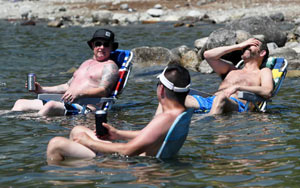Officials told Reuters that at least 233 people died in the West coast province of British Columbia between Friday and Monday, about 100 more than the average for a four-day period. They added that the number was expected to rise as more reports were filed.
Environment Canada has issued alerts for British Columbia, Alberta, and parts of Saskatchewan, Manitoba, Yukon and the Northwest Territories, saying the "prolonged, dangerous and historic heat wave will persist through this week."
The deaths came as Canada set a new all-time high temperature record for a third day in a row on Tuesday, reaching 49.6 degrees Celsius in Lytton, British Columbia. The heat wave has forced schools and Covid-19 vaccination centers to close in the Vancouver area.
For the 3rd day in a row Canada 🇨🇦 has seen a record breaking temperature of almost 5️⃣0️⃣°C in Lytton, BC.
— BBC Weather (@bbcweather) June 30, 2021
The record before this #heatwave has been broken by an incredible 4.6 degrees (most records are broken by fractions of degrees) 🌡https://t.co/QNiiCjZSKJ pic.twitter.com/XhUNTItVcu
"Vancouver has never experienced heat like this, and sadly dozens of people are dying because of it," a police official told AFP.
"Since the onset of the heat wave, the BC Coroners Service has experienced a significant increase in deaths reported where it is suspected that extreme heat has been contributory," the investigative service said in a statement on Monday.
It added that investigators were gathering information to determine the cause and manner of deaths and whether heat played a role.
Environmental heat exposure can lead to severe or fatal results, particularly in older people, infants and young children and those with chronic illnesses, chief investigator said in the statement.
British Columbia Premier John Horgan told a news conference, said, "We are in the midst of the hottest week British Columbians have ever experienced, and there are consequences to that, disastrous consequences for families and for communities,"
"How we get through this extraordinary time is by hanging together."
British Columbia includes Vancouver province.
He urged "checking up on those people we know might be at risk, making sure we have cold compresses in the fridge or we're staying in the coolest part of our homes, and making sure that we're taking steps to get through this heat wave."
Temperatures in the US Pacific Northwest cities of Portland, Oregon and Seattle, Washington reached levels not seen since record-keeping began in the 1940s: 46.1 degrees Celsius in Portland and 42.2 degrees Celsius in Seattle on Monday, according to the National Weather Service.

The US National Weather Service has issued a warning, urging people to "stay in air-conditioned buildings, avoid strenuous outdoor activities, drink plenty of water, and check on family members/neighbors."
The extreme heat, combined with intense drought, also created the perfect conditions for several fires to break out over the weekend, and one blaze on the California-Oregon border had already burned some 1,500 acres (600 hectares) by Monday morning.
"Dubai would be cooler than what we're seeing now," David Phillips, a senior climatologist for Environment Canada, told AFP.
Canada is widely known for its brutal winter and snows, and prior to the weekend the historical high in Canada was 45 degrees Celsius, set in Saskatchewan in 1937, according to Environment and Climate Change Canada.
The scorching heat stretching from the US state of Oregon to Canada's Arctic territories has been blamed on a high-pressure ridge trapping warm air in the region.
The heatwave in the Pacific Northwest, which is more accustomed to long bouts of rain than sun, resulted from a high pressure system that wasn't moving, said Greg Flato, a senior research scientist with Environment and Climate Change Canada based in Victoria.
Climate change is causing record-setting temperatures to become more frequent. Globally, the decade to 2019 was the hottest recorded, and the five hottest years have all occurred within the last five years.










